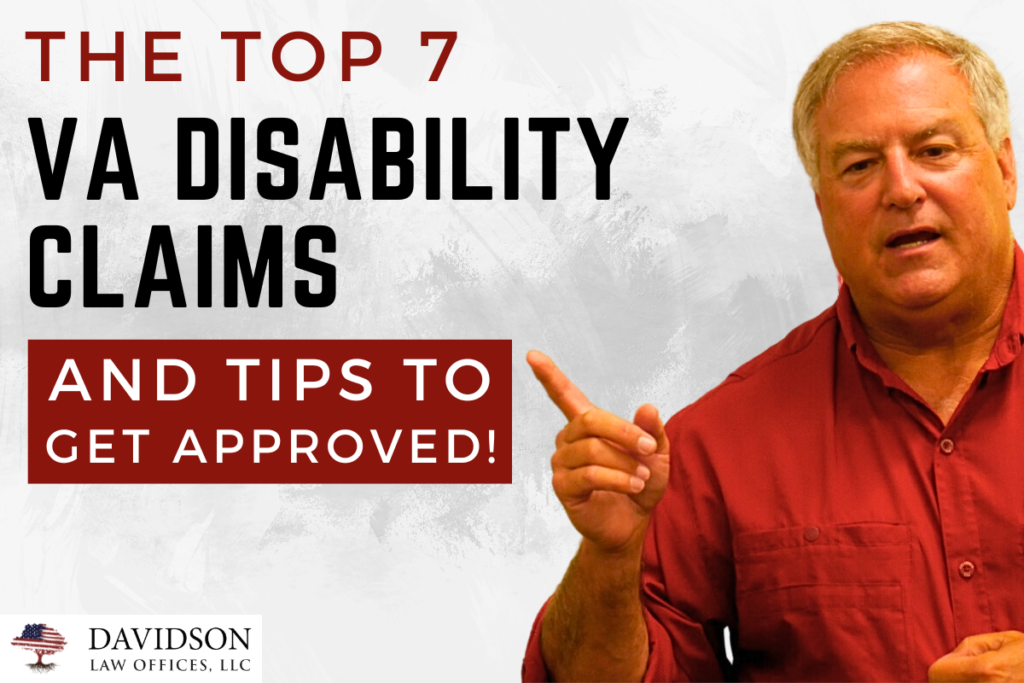Hey folks, Dale Davidson here, the VA guy, coming at you with a jam-packed blog post! We’re diving into the most awarded and top seven VA disability claims. Today, we’ll focus on one claim in particular—Post-Traumatic Stress Disorder (PTSD). Stay tuned for follow-up posts where we’ll dissect the other six in more detail.
The Top Seven VA Disability Claims
- Post-Traumatic Stress Disorder (PTSD)
- Musculoskeletal Disorders
- Tinnitus and Hearing Loss
- Scars and Burns
- Traumatic Brain Injury (TBI)
- Gulf War Syndrome
- Residuals from Agent Orange
These VA disability claims are commonly awarded due to the specific medical conditions or injuries veterans often experience during their military service. While the exact numbers can vary, these seven are consistently prevalent among veterans. Today, we’ll take a deep dive into PTSD, exploring what you need to succeed with a PTSD claim.
Understanding PTSD
PTSD is a mental health condition that can develop after experiencing a traumatic event, often referred to as a “stressor.” It’s prevalent among veterans who have experienced combat, military sexual trauma, or other traumatic events during their service.
Winning a PTSD Claim
Winning a VA disability claims for PTSD requires a lot of preparation, documentation, and persistence. Providing clear and credible evidence of the traumatic event, its impact on your mental health, and the connection to your military service is essential. Working with knowledgeable professionals and organizations can strengthen your claim and improve your chances of receiving the disability benefits you deserve.
Key Steps to Increase Your Chances for Success
- Establishing Service Connection
- Document your stressor: Provide evidence of the traumatic events (stressors) that caused or aggravated your PTSD. This could include combat experiences, military sexual trauma, or witnessing traumatic events. Supporting documentation from fellow service members can also strengthen your claim.
- Medical Evidence
- Obtain medical records that document your PTSD symptoms. Your military records can help prove your stressor, and medical records from a psychologist or psychiatrist trained in diagnosing PTSD can bolster your claim. Don’t rely solely on the VA’s evaluation—get your own independent medical opinion.
- Personal Statements
- Write a detailed statement describing how the traumatic events affected you physically, emotionally, and socially. Explain the severity of your symptoms and how they impact your daily life, work, and relationships. For instance, if you can’t handle loud noises or fireworks, or if you’re socially withdrawn because of PTSD, make sure to describe these issues in detail.
- Buddy Statements
- If you kept in touch with friends from your unit, get statements from them to bolster your personal statement. They can corroborate your experiences and the traumatic events you endured.
- VA Examination
- You’ll have to go through a VA examination (C&P exam) with a VA psychologist or psychiatrist. They will evaluate your symptoms and assess whether they meet the criteria for PTSD according to VA guidelines. However, getting an independent medical opinion is crucial, as the VA may not always side with you.
- Continuity of Symptoms
- Show that your PTSD symptoms have been continuous since the event and have not significantly improved over time. Document any changes in symptoms and treatments received.
- Legal and Advocacy Assistance
- Veteran Service Organizations (VSOs) like the DAV, VFW, and American Legion can provide support, guidance, and representation throughout the VA disability claim process. If your VA disability claim is complex or if you’re not getting satisfaction from a VSO, consider contacting a veterans law attorney who specializes in VA disability claims.
Final Thoughts
Winning VA disability claims for PTSD can be complex due to the nature of the condition and the need for substantial evidence. However, with the right preparation, documentation, and support, you can increase your chances of success. If your claim is denied or if you disagree with the rating assigned, remember that you always have the right to appeal.
Contact Us for Help!
If you need assistance with VA disability claims, complete this form or give us a call at (229) 226-8183. If you’d like to see this blog in video format, you can watch it below. Please be sure to SUBSCRIBE to our YouTube channel and click the bell notification button so that you’re notified each time we publish a new video.

